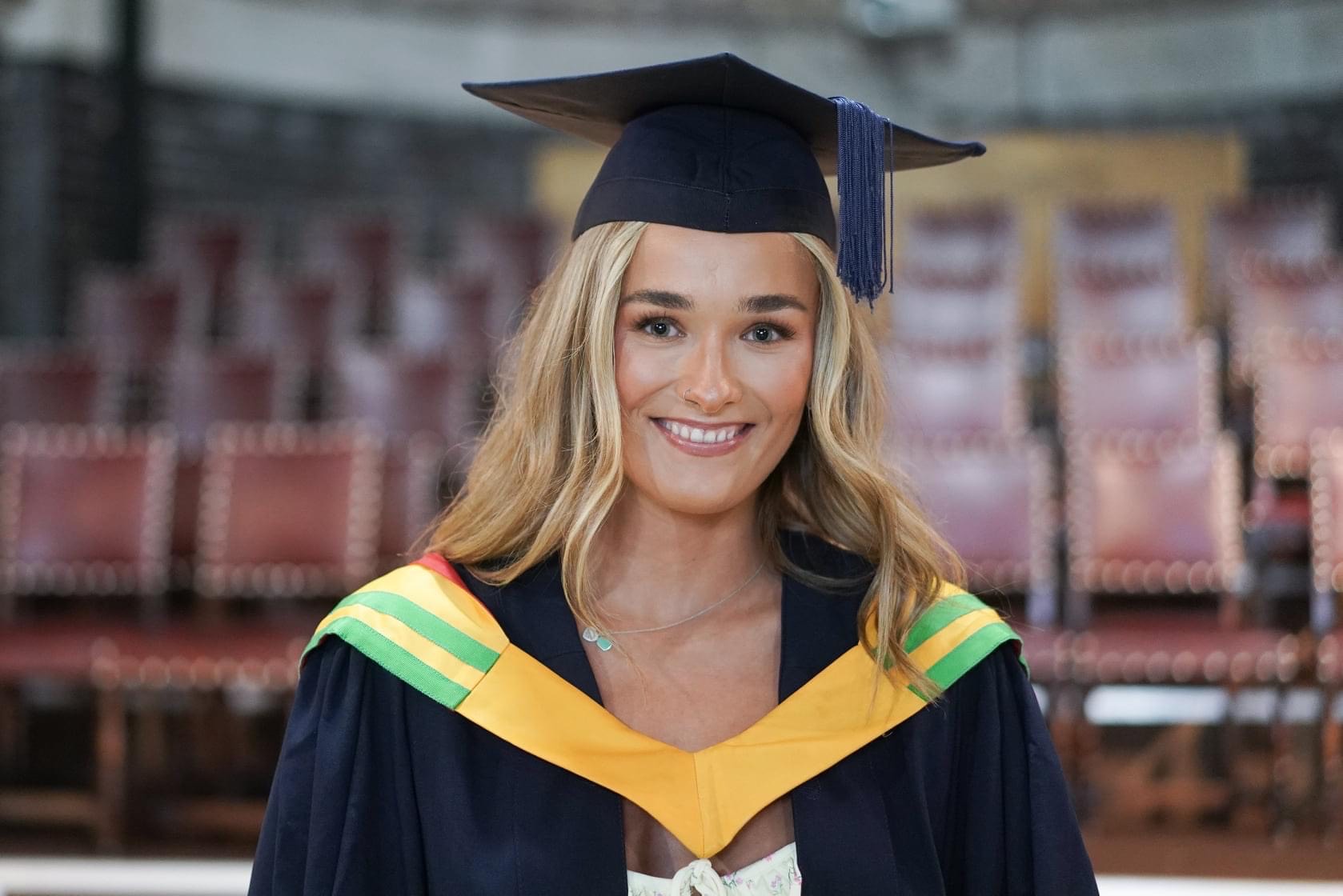A tenacious Psychology graduate is celebrating after landing a sought-after job as an Assistant Psychologist.
And Erica Winter says many hours spent volunteering while studying at Liverpool Hope University was crucial in her developing the skills and confidence to succeed.
The 23-year-old is now urging other Hope students to follow suit, describing how voluntary work has had a profound impact on both her personal and professional life.
Erica, from Pontefract, West Yorkshire, graduated from Hope in 2020, and has enjoyed a number of roles since, giving her a real breadth of experience.
She first worked as a neuro-rehabilitation support worker with private brain injury specialists Ariya Neuro Care.
During her time there Erica worked with a diverse mix of clients, from road accident survivors to those who’ve had strokes.

And while the work was ‘highly demanding’, she adds: “It was also incredibly rewarding because you could really see the difference that you were making to the patient’s life.
“Even after just a week of working with them, you could chart the progress, and that was something that always made me extremely happy.
“Each day was different. I learned so much, working with lots of other disciplines, from doctors and nurses to occupational therapists.”
Erica next moved to a women’s mental health unit at a private hospital in Rotherham, South Yorks, helping to support people with a range of conditions from schizophrenia to bipolar disorder.
She adds: “It was about teaching the patients skills that they could then transfer into the community. And it was an incredibly worthwhile experience.”
Now Erica has been appointed as an Assistant Psychologist working with NAViGO Health and Social Care - a social enterprise that provides mental health services to the NHS and beyond across North East Lincolnshire - following an extremely competitive recruitment process.
It’s an important role that will see her working with people with autism, providing clinical assessments and interventions, under the supervision of a clinical psychologist.
She’ll also have the opportunity to conduct research, write reports and literature reviews, as well as provide clinical and service audits, to ensure the correct interventions are in place - and working - for the people who need them.
Underpinning all of this success for Erica is her time volunteering with the Women’s Enterprising Breakthrough (WEB) Merseyside, a charity headquartered in Wirral and which works to support women, men and children through a variety of issues.
Over the course of five months she racked-up more than 100 hours of volunteering time.
And she urges: “The one thing I’d say to students is just to try and get as much experience as you possibly can, including while you’re at university. If you don’t like a particular role, stil just stick it out for a few months and add that time to your CV.
“Because you can’t go into an Assistant Psychologist role without a good amount of experience behind you.
“My time at WEB saw me working with young people, trying to empower them, promote self confidence, and to reduce isolation and victimisation. I also did home visits and admin work.
“Working at WEB also taught me about emotional boundaries and how not to take on other people’s emotions. My time there has held me in good stead and I would 100 per cent urge students to try and volunteer at organisations like WEB.
“It’ll give you an insight about the sorts of people you might want to work with. And it also allows you to have an impact on someone’s life. When you build trust, and people open up to you, it’s so rewarding.”
Speaking specifically about her Assistant Psychologist appointment, Erica adds: “I see this is a really important step in my journey to becoming a clinical psychologist, and I hope to complete a Doctorate in clinical psychology in the future after I’ve gained more experience.
“I want to learn, and I want to gain more skills. And I think having that attitude and approach is something that actually helped me to secure this job in the first place, because I was open and transparent in my interview that I don’t currently have experience working with people with autism. But I do want to gain that knowledge under the supervision of others.”
And how did Erica find her time at Hope?
She reveals: “I really liked the fact that I could contact any of my tutors and they’d always have time for me. They’d allow me to vent, they’d listen to me cry, and I’m still in contact with some of them now despite me not being at Hope any more.
“Again, for any undergraduates reading this, I’d stress the importance of gaining experience.
“Having your degree is useful, of course, but you need the experience in the field so that you can apply your knowledge and think, ‘Oh, this theory might apply to this scenario’.
“It’s about getting your experience from the shop floor, not just a textbook.
“Also, don’t be scared or put-off by the competitive nature of working in the industry. Have the belief that your knowledge and experience is good enough to apply for the role you want.
“I always doubted myself - but perhaps I shouldn’t have been so afraid because I’ve now got a job I always wanted.”



